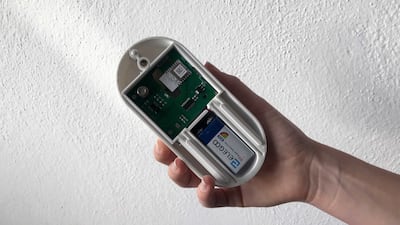While life in big cities comes with plenty of advantages, there is no denying it can also be a lonely existence for those living by themselves.
With that in mind, a German designer has created an alert system to notify neighbours that someone living on their own has died.
The device, known as In Memoriam, uses an odour detector and a signal lamp outside the home, to alert passers-by that an occupant inside has died.
The odour detector reacts to particles created by the human body that decays after death.
creator of In Memoriam
“The anonymity of cities leads to cases in which the deceased might not be discovered for weeks,” said Ony Yan, 30, who created In Memoriam while studying at the University of Applied Sciences in Berlin.
“The idea was to offer a technical solution and address the core of the cause: people die undetected because they no longer know and care about each other. So how can one encourage social responsibility in a house community?”
The lamp is displayed on the outside of a house entrance or apartment building to serve as a constant reminder to look out for one another.
“Should the lamp light up, the surrounding community can either gather together and figure out who died while calling authorities to open the door, or ignore the ‘problem’,” said Ms Yan.
“I wanted to give a chance for social togetherness and responsibility.”
She told The National how a personal experience inspired her to create the device.
“It started with a tragic case in my neighbourhood, where someone died and was unfortunately discovered very late,” she said.
“The smell of decomposition filled the hallway and the whole house was almost covered with flies.
“That person was dead for weeks but we only became aware of his passing when the body started decomposing.”
This led her to research other similar deaths in Berlin and she soon became aware it was a global phenomenon.
“The deceased are often discovered by family members without any mental preparation and it is a very traumatic experience,” said Ms Yan.
This led to her developing the project under the supervision of Prof Pelin Celik.
The issue of people dying alone at home, with their bodies not being discovered for some time, was compounded during the Covid-19 pandemic.
During the pandemic, there was a 70 per cent increase in the UK in the number of people who died at home alone and were not discovered for weeks.
That was according to a report from pathologists at the Imperial College Healthcare Trust, which was published in the Clinical Pathology journal.
The In Memoriam device is not yet available commercially, but Ms Yan hopes to secure funding to launch the product.
“Currently, this home system is not yet available in the market,” she said.
“The prototype is functioning, but due to my limited access to funding and engineering support, it is not yet fitted with a sensor with enough sensitivity.
“Science is still researching specific volatile organic compounds of what differentiates us in smell from animals when we decompose, as for now, the closest we smell like is chicken when we are dead.”
There are also hidden benefits to the early detection of dead bodies, added Ms Yan.
“It will ensure that real estate does not require costly refurbishment and other institutions like funeral homes and the police would benefit from the early discovery of corpses, before they rot severely,” she said.
“Crime cases become harder to detect the further decomposition has progressed.”



